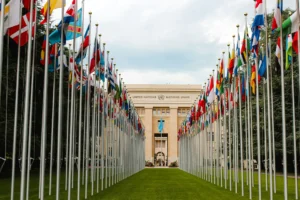It was in the 1980s that the notion of sustainable development emerged, which has become a major challenge of the 21st century. In concrete terms, sustainable development means
development that meets the needs of the present without compromising the ability of future generations to meet their own needs
(Mrs Gro Harlem Brundtland, Norwegian Prime Minister, 1987).
The need to reconcile economic and social progress with environmental protection.
The limits of development explain the emergence of sustainable development.
First of all, demographics: forecasts estimate the world's population at 10 billion by the end of the century, representing a significant increase in consumption.
Today, 80% of wealth is consumed by 20% of the population. These figures illustrate real disparities in wealth, which will only increase as the resources needed to meet our needs become increasingly scarce.
We also make massive use of fossil fuels, which exacerbates the problem of resource depletion. Finally, mass consumption leads to environmental degradation, causing global warming in particular.
Against this backdrop, sustainable development is becoming an increasingly important part of political strategies and individual behavior. It is a mode of development that contributes to the needs of the present without compromising the ability of future generations to meet their own needs.
Sustainable development is based on three pillars: ecological, economic and social. The main objectives are efficient, socially equitable and ecologically sustainable economic development.
The economic side of sustainable development is based on the creation of an economy deemed innovative, enabling prosperity without negatively impacting the environment or different communities around the world.
Behind the social pillar, ensuring the health and safety of communities goes hand in hand with this idea of equity. Achieving social equity means ensuring the well-being and fulfillment of all, the development of communities and respect for diversity.
For ecology, it's all about preserving ecosystems to sustain life on Earth.
The notion of sustainable development is transnational: it does not refer to a geographically limited phenomenon, but is used worldwide. This means that the players involved in promoting the idea and helping to achieve its objectives are equally diverse and spread across the four corners of the globe.
Here we find:
These are the States. Sustainable development now occupies a certain place within governments, as well as within international organizations made up of member states. All the structures in which the State intervenes as a driving member of the organization, constitute State players.
One example is the United Nations, which in 2000 set the Millennium Goals to be achieved by 2015. Following the success of this project, the States agreed to set the Sustainable Development Goals in 2015, to be achieved by 2030.

This category of players includes all non-state participants in sustainable development. They include:
Everyone, at their own level and according to their degree of involvement in this cause, will be able to mobilize different levers to positively impact sustainable development through their activity.
Citizens, for example, will try to influence national and international organizations through mobilizations and demonstrations.
Businesses can try to combine wealth creation and growth with a sustainable mode of production that contributes to social equity.
Last but not least, NGOs, through all their actions, are directly involved in sustainable development, on a social and/or ecological level, to ensure growth, preservation of the environment and the well-being of all.
Share it on social media!




Contact us

Latest news, new programs, travel ideas… one news per month guaranteed without spam!








